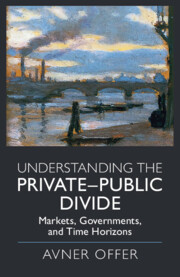Refine search
Actions for selected content:
26944 results in Economic history
Made in Hong Kong: Transpacific Networks and a New History of Globalization. By Peter E. Hamilton. New York: Columbia University Press, 2021. xv + 419 pp. Notes, bibliography, index. Paperback, $35.00, ISBN: 978-0-231-18485-4.
-
- Journal:
- Business History Review / Volume 96 / Issue 2 / Summer 2022
- Published online by Cambridge University Press:
- 29 July 2022, pp. 474-477
- Print publication:
- Summer 2022
-
- Article
- Export citation
Monetary War and Peace: London, Washington, Paris, and the Tripartite Agreement of 1936. By Max Harris. Cambridge: Cambridge University Press, 2021. xiii + 279 pp. Appendixes, index. Hardcover, C$126.95. ISBN: 978-1-108-48495-4.
-
- Journal:
- Business History Review / Volume 96 / Issue 2 / Summer 2022
- Published online by Cambridge University Press:
- 29 July 2022, pp. 466-469
- Print publication:
- Summer 2022
-
- Article
- Export citation
Hollywood's Embassies: How Movie Theaters Projected American Power around the World. By Ross Melnick. New York: Columbia University Press, 2022. 528 pp. Notes, index. Paperback, $35.00. ISBN: 978-0-231-20151-3.
-
- Journal:
- Business History Review / Volume 96 / Issue 2 / Summer 2022
- Published online by Cambridge University Press:
- 29 July 2022, pp. 456-458
- Print publication:
- Summer 2022
-
- Article
- Export citation
Recent Trends in the Business History of Russia: The Blurry Borders of the Discipline
-
- Journal:
- Business History Review / Volume 96 / Issue 2 / Summer 2022
- Published online by Cambridge University Press:
- 29 July 2022, pp. 325-351
- Print publication:
- Summer 2022
-
- Article
-
- You have access
- Open access
- HTML
- Export citation
Shutdown: How Covid Shook the World's Economy
-
- Journal:
- Business History Review / Volume 96 / Issue 2 / Summer 2022
- Published online by Cambridge University Press:
- 29 July 2022, pp. 433-439
- Print publication:
- Summer 2022
-
- Article
- Export citation
Porcelain: A History from the Heart of Europe. By Suzanne L. Marchand. Princeton: Princeton University Press, 2020. 544 pp. Illustrations, tables, notes, bibliography, index. Paperback, $24.95. ISBN: 978-0-691-20423-9.
-
- Journal:
- Business History Review / Volume 96 / Issue 2 / Summer 2022
- Published online by Cambridge University Press:
- 29 July 2022, pp. 446-448
- Print publication:
- Summer 2022
-
- Article
- Export citation
BHR volume 96 issue 2 Cover and Front matter
-
- Journal:
- Business History Review / Volume 96 / Issue 2 / Summer 2022
- Published online by Cambridge University Press:
- 29 July 2022, pp. f1-f7
- Print publication:
- Summer 2022
-
- Article
-
- You have access
- Export citation
Invisible China: How the Urban-Rural Divide Threatens China's Rise. By Scott Rozelle and Natalie Hell. Chicago: University of Chicago Press, 2020. 248 pp. Figures, tables, appendix, notes, index. Cloth, $27.50. ISBN: 9-780-22673-952-6.
-
- Journal:
- Business History Review / Volume 96 / Issue 2 / Summer 2022
- Published online by Cambridge University Press:
- 29 July 2022, pp. 482-484
- Print publication:
- Summer 2022
-
- Article
- Export citation

Engraving Accuracy in Early Modern England
- Visual Communication and the Royal Society
-
- Published by:
- Amsterdam University Press
- Published online:
- 26 May 2022
- Print publication:
- 08 March 2022
-
- Book
- Export citation

One Virus, Two Countries
- What COVID-19 Tells Us about South Africa
-
- Published by:
- Wits University Press
- Published online:
- 13 May 2022
- Print publication:
- 01 November 2021
Going Dutch: monetary policy in the Netherlands during the interwar gold standard, 1925–1936
-
- Journal:
- Financial History Review / Volume 29 / Issue 2 / August 2022
- Published online by Cambridge University Press:
- 05 May 2022, pp. 121-151
-
- Article
-
- You have access
- Open access
- HTML
- Export citation
FHR volume 29 issue 1 Cover and Front matter
-
- Journal:
- Financial History Review / Volume 29 / Issue 1 / April 2022
- Published online by Cambridge University Press:
- 26 April 2022, pp. f1-f2
-
- Article
-
- You have access
- Export citation
FHR volume 29 issue 1 Cover and Back matter
-
- Journal:
- Financial History Review / Volume 29 / Issue 1 / April 2022
- Published online by Cambridge University Press:
- 26 April 2022, pp. b1-b2
-
- Article
-
- You have access
- Export citation

Understanding the Private–Public Divide
- Markets, Governments, and Time Horizons
-
- Published online:
- 14 April 2022
- Print publication:
- 07 April 2022
Chapter 1 - Patient Capital
-
- Book:
- Understanding the Private–Public Divide
- Published online:
- 14 April 2022
- Print publication:
- 07 April 2022, pp 11-42
-
- Chapter
- Export citation
References
-
- Book:
- Understanding the Private–Public Divide
- Published online:
- 14 April 2022
- Print publication:
- 07 April 2022, pp 177-219
-
- Chapter
- Export citation
Contents
-
- Book:
- Understanding the Private–Public Divide
- Published online:
- 14 April 2022
- Print publication:
- 07 April 2022, pp vii-vii
-
- Chapter
- Export citation
Chapter 2 - Corruption and Integrity
-
- Book:
- Understanding the Private–Public Divide
- Published online:
- 14 April 2022
- Print publication:
- 07 April 2022, pp 43-56
-
- Chapter
- Export citation
Index
-
- Book:
- Understanding the Private–Public Divide
- Published online:
- 14 April 2022
- Print publication:
- 07 April 2022, pp 220-228
-
- Chapter
- Export citation
Tables
-
- Book:
- Understanding the Private–Public Divide
- Published online:
- 14 April 2022
- Print publication:
- 07 April 2022, pp x-x
-
- Chapter
- Export citation
